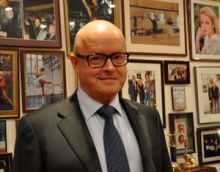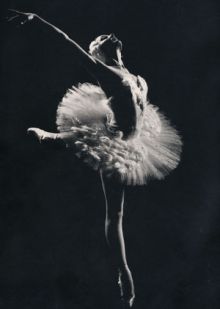Today the name of Nikolay Grishko is known in many countries of the world. He used to work as a diplomat (in the 1970s he served at the USSR embassy in Laos) and a teacher in the Moscow-based Plekhanov Institute of National Economy and the Institute of Professional Skills Improvement for the Leading Workers of Light and Textile Industries. Grishko never forgot about his roots (he is a descendant of the famous geneticist, selectionist, Academician Mykola Hryshko), inheriting the best traits of his grandfather’s character, of which the most important one is to achieve the goals he sets. For 20 years he has been president of the Grishko firm, producing dance shoes and costumes. Grishko’s customers include dancers from the leading theaters of Russia, Bulgaria, the Czech Republic, and Ukraine (a professional ballerina needs minimum six to seven pairs of pointes a month). Currently Grishko is vice president and full member of the International Academy of Theater, co-founder of the Choreography Association, vice president of the regional Smoktunovsky Charity Foundation for Theater and Television.
Mr. Grishko, the maternity hospital you were born in is located not far from the Kyiv Opera House, but in one of your interviews you admitted that parents failed to impart love for ballet in you. However, nowadays many famous dancers are frequent guests in your office.
“I was born in the maternity hospital opposite to St.Volodymyr Cathedral. I grew up in the apartments of my father and mother’s parents, in 11 and 15 Tolstoho St. As a child I did not feel any special love for ballet, because my parents started to take me to performances too early. I am sure that children should be familiarized with ballet no sooner than at the age of seven and go first to fairytales and productions for children. As a rule, teenage boys prefer to play football, but they cannot appreciate all the niceties of ballet. Later, when I got acquainted with my future wife Tamara, I started to treat dances, and later ballet, with special attention. She performed on stage, being one of the best tap dancer in the former USSR. After I learned everything about dance to a nicety, I came to love ballet.”
Hryshko is a very popular name in Kyiv, especially in scholarly and artistic circles. Yet few people know that you are a descendant of Academician Mykola Hryshko. Do you frequently go to the Botanic Garden named after your grandfather? Aren’t there any symbolic plants or flowers connected with the world of dance?
“Of course, I am proud of the fact that Academician Mykola Hryshko, after whom the Kyiv Botanic Garden of the Academy of Science was named, is my grandfather. In his memory I set up a foundation, which delivers three cash prizes to Ukraine’s best young dendrologists. By the way, few people know that Mykola Hryshko loved music and wrote verse, and poets and musicians frequently visited our home. Since childhood I have remembered the charming baritone of wonderful singer Mykhailo Hryshko, which made our crystal chandelier in the living room tremble. Unfortunately, I am a rare guest to the Botanic Garden, because I rarely come to my beloved Kyiv. The Botanic Garden was a favorite brainchild of my grandfather. The departments of biology, ecology, selection, physiology, and biochemistry were created there. My grandfather made titanic efforts in creation the exposition plots in the Botanic Garden and its capital construction. He personally assisted in bringing over 800 species of roses, lilac, and various hothouse plants from Germany. I will remind that the Botanic Garden was opened in April 1964, but unfortunately Mykola Mykolaiovych did not live to that day. He died on January 4, 1964.”
In your speeches you connect your success with natural stubbornness, typical of Ukrainians.
“Am I successful? Perhaps. I owe it to my parents, from whom I inherited wonderful Ukrainian genes. Truly, a ‘Cossack kin knows no end.’ First and foremost it refers to such trait as the desire to be independent: I cannot stand being bossed around. And no less important feature I have inherited is the natural, typical of Ukrainians, stubbornness in achieving their goals. It has come useful to me in my life.”








